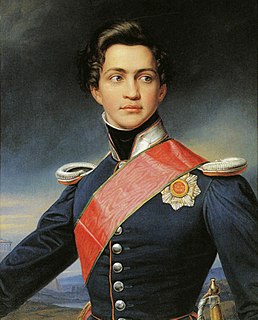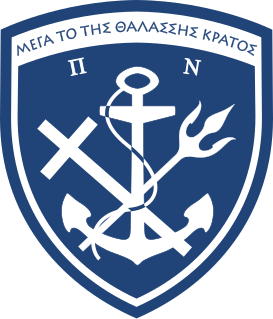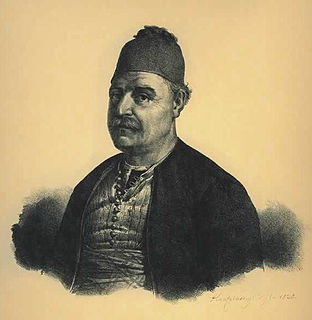This article needs additional citations for verification .(November 2018) (Learn how and when to remove this template message) |
| Andreas Miaoulis Ανδρέας Μιαούλης | |
|---|---|
| Born | 1819 Hydra, Ottoman Empire |
| Died | 1887 Salamis Island, Greece |
| Nationality | Greek |
| Occupation | naval officer |
Andreas Miaoulis (Greek : Ανδρέας Μιαούλης, 1819–1887) was a Greek naval officer, hailing from the distinguished Hydriot Miaoulis family. He was the son of Dimitrios Miaoulis and grandson of Andreas Miaoulis, the celebrated admiral of the Greek War of Independence. [1]

Greek is an independent branch of the Indo-European family of languages, native to Greece, Cyprus and other parts of the Eastern Mediterranean and the Black Sea. It has the longest documented history of any living Indo-European language, spanning more than 3000 years of written records. Its writing system has been the Greek alphabet for the major part of its history; other systems, such as Linear B and the Cypriot syllabary, were used previously. The alphabet arose from the Phoenician script and was in turn the basis of the Latin, Cyrillic, Armenian, Coptic, Gothic, and many other writing systems.
The Greeks or Hellenes are an ethnic group native to Greece, Cyprus, southern Albania, Italy, Turkey, Egypt and, to a lesser extent, other countries surrounding the Mediterranean Sea. They also form a significant diaspora, with Greek communities established around the world.
Dimitrios Miaoulis was a Greek revolutionary leader.
He was born in Hydra, then still part of the Ottoman Empire, in 1819. After Greece became independent, he joined the Royal Hellenic Navy as a lieutenant in 1836. He was very well versed in naval affairs, and enjoyed the friendship of King Otto, who kept him as the captain of his royal yacht. After Otto's ouster in 1862, he was transferred as naval attaché to the Ottoman capital, Constantinople, where he remained for several years. Following his return, he was responsible for the re-organization of the main Greek naval base at Salamis Island. He committed suicide in 1887, by falling from the balcony of the naval base headquarters.

The Ottoman Empire, also historically known in Western Europe as the Turkish Empire or simply Turkey, was a state that controlled much of Southeast Europe, Western Asia and North Africa between the 14th and early 20th centuries. It was founded at the end of the 13th century in northwestern Anatolia in the town of Söğüt by the Oghuz Turkish tribal leader Osman I. After 1354, the Ottomans crossed into Europe, and with the conquest of the Balkans, the Ottoman beylik was transformed into a transcontinental empire. The Ottomans ended the Byzantine Empire with the 1453 conquest of Constantinople by Mehmed the Conqueror.

Otto was a Bavarian prince who became the first modern King of Greece in 1832 under the Convention of London. He reigned until he was deposed in 1862.

Constantinople was the capital city of the Roman Empire (330–395), of the Byzantine Empire, and also of the brief Crusader state known as the Latin Empire (1204–1261), until finally falling to the Ottoman Empire (1453–1923). It was reinaugurated in 324 from ancient Byzantium as the new capital of the Roman Empire by Emperor Constantine the Great, after whom it was named, and dedicated on 11 May 330. The city was located in what is now the European side and the core of modern Istanbul.








